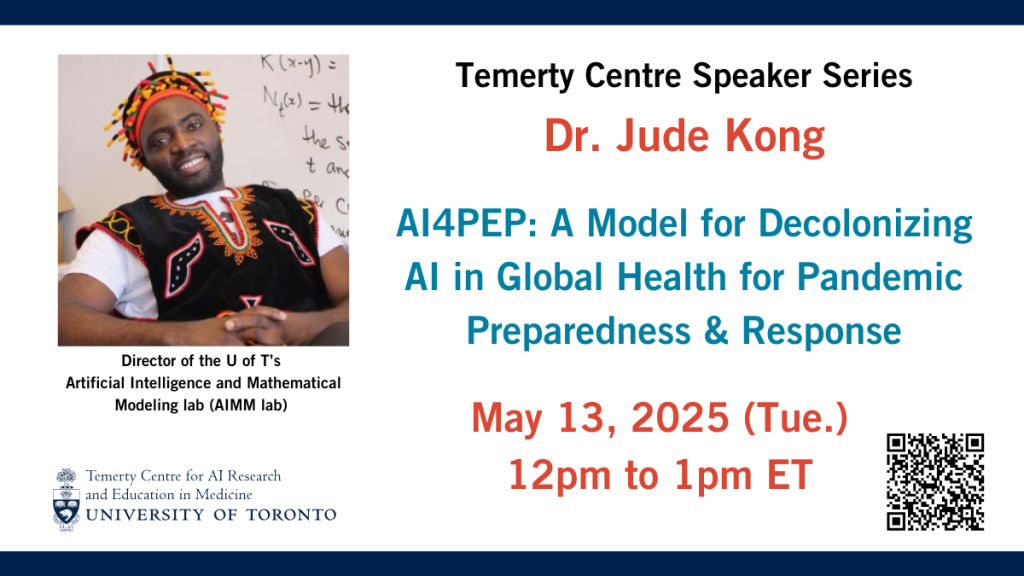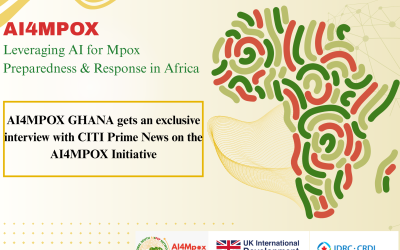
Harnessing AI for Health Equity: Reflections from the T-CAIREM Speaker Series
At the recent Toronto Center for AI Research and Education in Medicine (T-CAIREM) Speaker Series for the month of May 2025, our Executive Director, Dr. Kong, a leading voice in digital health innovation, delivered a powerful keynote exploring the trajectory of artificial intelligence (AI) in health equity, particularly across the Global South. Representing AI4PEP Network, Dr. Kong highlighted the urgent need to center community engagement, ethical innovation, and scalable AI solutions rooted in local realities during hid talk titled: “AI4PEP – A Model for Decolonizing AI in Global Health for Pandemic Preparedness and Response”
Drawing from work done in partnership with AI4PEP, MS Lab, and the Africa-Canada Artificial Intelligence and Data Innovation Consortium collaborators across the Global South, Dr. Kong emphasized how AI is being used to respond to real-world health challenges. Whether it’s using wearable devices for mental health awareness or leveraging environmental data to monitor disease trends, AI technologies are increasingly being developed in community contexts, with the goal of scaling them beyond borders. For AI4PEP, scaling is not just about expanding reach; it’s about sharing solutions across contexts with integrity. As Dr. Kong explained, the goal is to move from solutions that live in university labs to ones that live and breathe in real communities. This means taking a model developed in Ghana and adapting it in the Philippines. It means training algorithms not just with imported datasets, but with local knowledge and lived experience.
“Our vision of scale goes beyond the lab or even national boundaries,” said Dr. Kong. “We want a solution built in Ghana to be applicable in Malaysia, the Philippines, or India, retrained with local data, but driven by a shared ethos of equity.”
The Case For Federated Learning
The conversation turned toward the challenge of data sharing and privacy, a major concern in health AI. While federated learning is not yet in widespread use across AI4PEP’s current projects, it is clearly on the horizon. The talk addressed the promise of federated learning as a way to overcome data privacy barriers while ensuring underrepresented communities aren’t left behind in the AI revolution. By enabling models to be trained across decentralized data sources without compromising individual privacy, federated learning aligns with AI4PEP’s core commitment to data justice and community trust. Dr. Kong described plans for upcoming workshops to train government officials on how this method allows data to be used without leaving its country of origin.
“We believe people should own their data,” Dr. Kong said emphatically, while reiterating the need for communities to be represented in datasets that shape the future of healthcare.
Ethical AI and Emotional Responsibility
In one of the most thought-provoking moments of the session, Dr. Kong addressed the growing emotional dimensions of AI. As AI systems increasingly engage with emotional and behavioral data, important questions arise: Who is accountable when things go wrong? What part of an AI system can truly be ‘owned’? These are precisely the types of questions AI4PEP is actively exploring with legal scholars, community leaders, and data governance experts across continents.
Drawing on a powerful metaphor, Dr. Kong likened AI to water: “Nestle may own the bottle, but not the water. The water belongs to all of us.” With this, he opened a broader conversation about intellectual property in AI, a conversation AI4PEP is leading globally, involving legal experts from both the Global North and South to ensure innovation does not come at the cost of justice.
From the Community, For the Community
The keynote included a reflection on what AI4PEP and its partners have learned from observing “weak signals”, emerging trends in mental health monitoring, environmental sensing, and digital diagnostics in the Global South. These signals, captured through expert input and bibliometric analysis, point to a transformation in how communities are taking health into their own hands.
“People who have never visited a therapist are now paying attention to their mental health,” Dr. Kong shared. “Not because of a breakthrough app alone, but because wearable technologies are making self-care visible and valued.”
A cornerstone of Dr. Kong’s message was the importance of community-based research. He encouraged aspiring researchers to build genuine relationships with community partners, to listen before designing solutions, and to resist extractive models of engagement.
“My advice to you is to build the relationships” he urged.” Care about solving an issue in your community first, something you’re passionate about.”
Looking Ahead
The conversation at T-CAIREM reaffirmed that AI, when approached with humility, ethics, and collaboration, has the power to transform public health. From mosquito species recognition in Ghana to emotionally responsive AI systems, the path forward is both technically exciting and morally complex.
AI4PEP remains committed to ensuring that as AI technologies evolve, they do so in service of communities, especially those historically excluded from the design and benefits of innovation.


